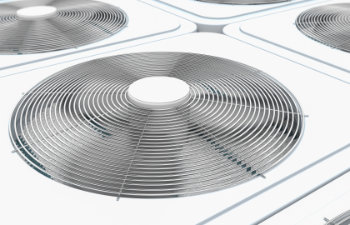
As we navigate the complexities of healthcare environments, one concern that often arises is whether the HVAC (heating, ventilation and air conditioning) systems in medical offices can contribute to the spread of illness. Given the close proximity of patients and the presence of various pathogens, Aeras Building Solutions addresses the role HVAC systems play in maintaining a healthy environment.
HVAC Systems in Medical Offices
HVAC systems are designed to regulate temperature, humidity and air quality within a facility. In medical offices, these systems must perform an even more critical function: controlling the spread of airborne pathogens. Contaminants can be introduced into the air from various sources, including patients, staff, and even building materials. Therefore, the importance of properly functioning HVAC systems cannot be understated.
The Fulton County Board of Health reports continued widespread flu activity throughout Atlanta and across the State of Georgia into February and March 2025. Keeping your medical office HVAC functioning optimally can help reduce the spread of illness.
How HVAC Systems Can Contribute to the Spread of Illness
- Airborne Pathogens: Many viruses and bacteria can be transmitted through the air, especially in enclosed spaces. An HVAC system that is not well-maintained or lacks adequate filtration can circulate these pathogens, increasing the risk of transmission among patients and staff.
- Poor Ventilation: Good ventilation is essential for diluting airborne contaminants. If the HVAC system does not provide fresh air or effectively exhaust stale air, the concentration of pathogens can rise, increasing the risk of illness.
- Humidity Levels: The humidity within a medical office needs to be maintained at appropriate levels. High humidity can promote the growth of mold and other allergens, while low humidity can dry out mucous membranes, making individuals more susceptible to infections.
- Filter Efficiency: The filters used in HVAC systems play a crucial role in trapping airborne particles, including bacteria and viruses. If filters are not changed regularly, they can become clogged, reducing their effectiveness and allowing pathogens to circulate freely.
Improve HVAC Safety in Your Medical Office
To mitigate the risks associated with HVAC systems, Aeras Building Solutions can help medical offices take several proactive measures:
- Regular Maintenance: Schedule regular inspections and maintenance for HVAC systems to ensure they are functioning correctly. This includes checking for leaks, ensuring proper airflow and maintaining components.
- Upgrade Filters: Use high-efficiency particulate air (HEPA) filters or other advanced filtration systems that can capture smaller particles, including those that carry diseases.
- Optimize Ventilation: Evaluate and, if necessary, improve the ventilation system to enhance air exchanges within the office. This can involve increasing the intake of fresh air or improving the exhaust of stale air.
- Monitor Humidity Levels: Utilize dehumidifiers or humidifiers as needed to maintain optimal humidity levels (generally between 30-50%) to ensure a comfortable and safe environment.
Atlanta GA Medical Office HVAC Services Contractor
While HVAC systems are crucial in creating a comfortable environment in medical offices, they can also pose a risk for the spread of sickness if not properly managed. Regular maintenance, efficient filtration and adequate ventilation are just a few steps that can significantly improve indoor air quality and reduce the potential for airborne illness. Contact Aeras Building Solutions to help you protect health and also enhances the overall patient experience in medical environments.
Posted on behalf of
